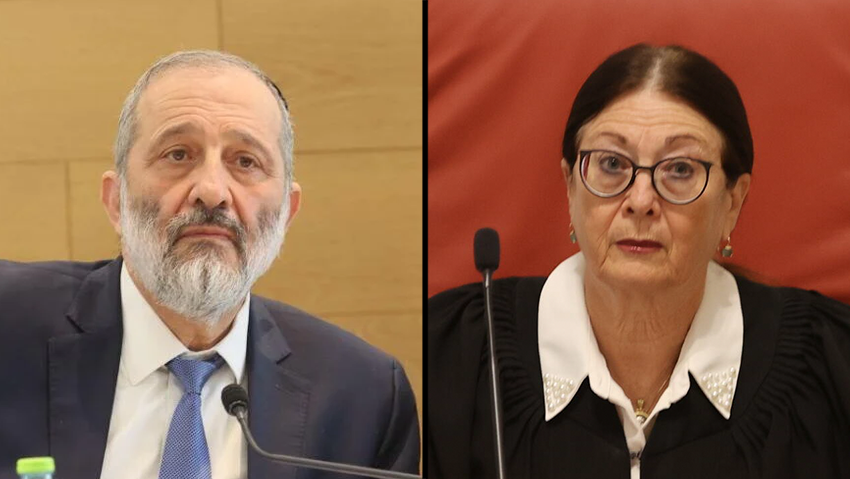Getting your Trinity Audio player ready...
Following the High Court of Justice ruling Wednesday, which disqualified Shas leader Aryeh Deri from serving as minister in the new government due to his tax fraud conviction, one person was left victorious - Justice Minister Yariv Levin. Now that the right-wing has been put on the defense, the chances of Levin's controversial judiciary reforms being passed have only increased.
The problem wasn't the ruling, which was just. Even its most ardent naysayers will struggle to challenge the court's reasoning. Yet, if you take into consideration all the potential outcomes of Wednesday's ruling, you can see that Israel is now one step closer to constitutional chaos.
5 View gallery


Shas leader Arye Deri and Supreme Court Chief Justice Esther Hayut
(Photo: Alex Kolomoisky, Moti Kimchi)
Publicly, Deri’s appointment as minister in the new government was always deemed unreasonable, backed by very legitimate claims.
The man was convicted twice - once on bribery, and once on tax evasion charges. He is not supposed to fill a position of an MK, let alone a minister. A court verdict is not necessary for this to be understood. What is necessary is decency, common sense and behavioral norms.
The public does seem to understand this logic. According to a survey from two weeks ago - 65% of Israelis object to Deri's appointment as minister. Even among the Netanyahu supporters, 43% object Deri's appointment, while only 42% support it.
Nonetheless, the High Court of Justice decision has sparked an uproar, and not only because of his conviction.
Prior to the verdict on his tax offenses case being released, Deri announced his retirement from political life. This granted him a plea bargain in the face of a lenient verdict. In that ruling, the judge ensured: "anyone who fears the accused and harm he caused to the public budget ... will be able to overcome this fear and say with certainty that the accused will not decide the needs of the public, and this is due to him distancing himself from the public sphere."
One day after that ruling, Deri announced his return to politics. This is fraud at the public level, and grounds for estoppel at the legal level. This is what laid the foundations for the dramatic ruling on Wednesday.
But, those who protested outside Deri's home on Wednesday evening, slamming "Ashkenazi judges," have no regard for the reasoning of the judges. It seems to be difficult for them to separate the ruling on Deri from other disqualifications of public figures in the past.
For instance, when it was the Palestinian politician Azmi Bishara in the defendant's seat, The High Court of Justice bent over backwards to override the law which was supposed to have him disqualified from running for the Knesset.
But, in Deri's case, 10 out of 11 judges on the panel found it reasonable to disqualify his appointment. Their decision is just, and their claims stand, but feeling of double standards still lingers in the air.
Consequently, the right-wing bloc is pointing fingers at the court's bias, claiming that had Deri been a left-center politician, the judges would have found a way to make his appointment look "kosher." Unfortunately, this claim cannot be dismissed outright.
As part of the broader public debate, another thing must be brought to our attention. The indictment against Deri's convictions were filed during the rule of former Attorney General Avichai Mandelblit.
Mandelblit has himself said at the time: "I received the Deri case as 'a very serious corruption case' ... Yet not a single fishy hint came out of it." So, while it is possible to point to his tax offenses, the former attorney general himself said there was nothing so severe that would render the lawmaker unfit to serve in the cabinet.
Therefore, if the judges really wanted to seal the deal, they would've ditched the claims of reasonability and estoppel, and joined judge Yosef Elron - the sole justice on the panel who on Wednesday gave Deri the benefit of the doubt.
You can argue the decision to disqualify Deri was just, but wasn't wise, because these sort of decisions are ties to politics. We are already in the midst of a public battle over the judiciary – perhaps the most serious of its kind in the history of the state.
Reforms are needed, everyone agrees on that. But, not the ones proposed by Levin - which present a constitutional hijacking that harms democracy.
And here lies the problem. Opponents of the reform have no reason to celebrate the decision, because Levin's claims just got a boost of legitimacy.
Levin can give himself a pat on the back. The High Court? Not so much.





